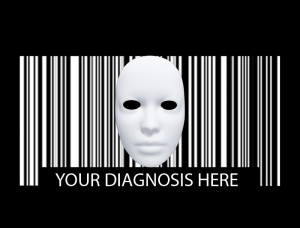 There’s an ongoing debate in mental health and addictions about the merits and demerits of ‘labeling’ clients.
There’s an ongoing debate in mental health and addictions about the merits and demerits of ‘labeling’ clients.
One side argues that when therapists employ terms like ‘bipolar’ or ‘schizophrenic’ or ‘alcoholic’, they’re inadvertently creating a self-fulfilling prophecy where the client then behaves in accordance with the label– in other words, is actually more likely to experience mood swings or hallucinations or drinking binges than if the label hadn’t been applied. In fierce opposition stand those clinicians, many on the medical side, who argue that without a clear description of what’s wrong and why, how can we expect the patient to comply with a treatment regimen? What would be the point?
A related issue has to do with our awareness that labels change. We recently received the fifth iteration of the Diagnostic and Statistical Manual of the American Psychiatric Association. Suddenly, longstanding descriptive categories like ‘substance abuse’ are no longer there. Does that mean people have stopped abusing substances? Of course not. It simply means we’ve decided to rename it.
At least for purposes of medical diagnosis, that is. You’re still not likely to hear an AA speaker identify himself as “Bruce, who has an Alcohol Use Disorder, moderate to severe, currently in sustained remission.”
Still, it’s true that clients tend to resist labels, some more fiercely than others. That’s partly due to stigma, but not entirely. Diabetes is every bit as common as drug abuse and far, far less stigmatized by society. Nonetheless, it’s not at all uncommon for a newly diagnosed patient to reject the diagnosis, or even get angry at the clinician who made it. That’s because of what having that particular label implies– the need to make a number of important changes that the patient frankly doesn’t feel like making.
Sure, those changes may just save your life, which justifies the extra effort. But it doesn’t make it any easier, or more pleasant.










